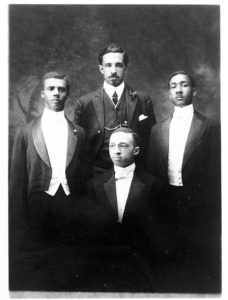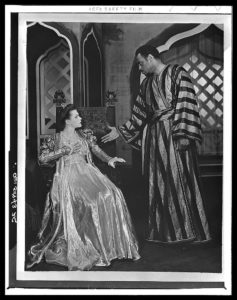August 1887 (135 Years Ago)

In Washington D.C., Thomas Montgomery Gregory was born on Aug. 31, 1887. Graduate of both Williston Seminary and Harvard University, Gregory became the first director of drama at Howard University. A strong advocate for Black empowerment through art, he once wrote, “If art is self-expression, it is necessarily race expression.” Gregory maintained that the U.S. needed a National Negro Theatre but was unable to realize his dream. He did, however, spark the National Negro Theatre Movement and inspired many students and eventual artists during his tenure at Howard and in his later career as supervisor of Negro Schools in Atlantic City, N.J. Gregory died in November 1971.
August 1937 (85 Years Ago)
Following the acclaim for their April 1936 production of Macbeth—later nicknamed Voodoo Macbeth—John Houseman and Orson Welles left the Works Progress Administration’s Federal Theatre Project, of which Houseman was the director of New York’s Negro Theatre Unit, and founded the Mercury Theatre in August 1937. The theatre, initially located in the Broadway district, premiered with a critically acclaimed adaptation of Shakespeare’s Julius Caesar. The company, with its troupe of performers, would later relocate to Hollywood and spread its influence through the hour-long radio program The Mercury Theatre on the Air, which beamed into households across the U.S., producing the infamous 1938 War of the Worlds broadcast and, later, through movies produced, directed, and written by Welles, including 1941’s Citizen Kane. That film dissolved Houseman and Welles’s relationship, and the Mercury Theatre eventually folded in 1946.
August 1942 (80 Years Ago)

The Brattle Street Theatre, in Cambridge, Mass., played host to the premiere of a thrilling production in August 1942. Actor Paul Robeson took the mantle of Shakespeare’s Othello—one of the first Black actors to do so on a major stage since Ira Aldridge in 1835. The Boston production, directed by Margaret Webster and featuring Uta Hagen and Jose Ferrer, was a smashing success and swiftly moved to Broadway in 1943. The production ran a total of 296 performances at the Shubert Theatre and remains one of the longest-running productions of a Shakespeare play to date.
August 1962 (60 Years Ago)
Following a celebrated run at the Edgewater Beach Playhouse in Chicago, Ossie Davis’ Purlie Victorious closed in the Windy City in August 1962. The production, starring Davis and his spouse, Ruby Dee, told the story of a minister attempting to help protect a small-town church and slow the cruel hand of a plantation owner. The serio-comedy had already had a Broadway run (September 1961 to May 1962) before hitting the road to cities like Chicago. Being Ossie Davis’s most successful play, it would later spawn a film, Gone Are the Days (1963), and a musical adaptation called Purlie, with music by Gary Geld and lyrics by Peter Udell (1970).
August 1997 (25 Years Ago)
Having served the San Antonio, Texas, public for three years, Magik Theatre finally moved into Beethoven Hall, a permanent performance space, in August 1997. The theatre had swiftly gained a strong reputation in the south-central Texas city after its formation by Richard Rosen in 1994. The theatre’s mission to make art for the children of San Antonio with a specific eye to literacy is expressed in its broad work in the community’s schools through tours and arts education. Magik Theatre remains one of the only professional resident theatre companies in the region.


